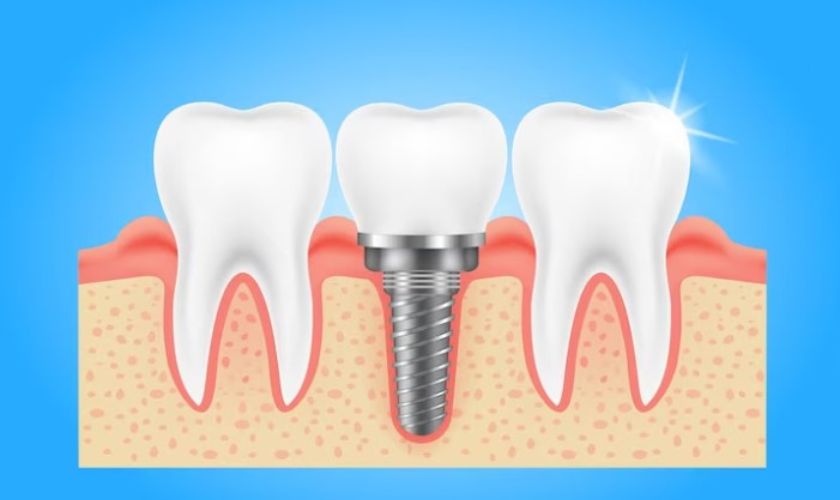2860 S Seacrest Blvd, Boynton Beach, FL 33435
Why Dental Implants Are The Future of Tooth Replacement

Smiling is contagious, and nothing beats the confidence boost that comes with a bright, healthy smile. Unfortunately, tooth loss is an all-too-common problem that can ruin your winning grin and make eating or speaking difficult. While dentures were once the go-to solution for replacing missing teeth, dental implants are quickly becoming the future of tooth replacement. Not only do they look and feel like natural teeth, but they also offer several benefits over traditional dentures. In this blog post, we’ll explore why dental implants are taking the world by storm and transforming smiles one implant at a time!
Dental Implants
Dental implants are the future of tooth replacement for many reasons. They are strong and durable, they look and feel like natural teeth, and they allow you to eat the foods you love.
If you are considering dental implants, it is important to understand the process and what to expect. The first step is to consult with your dentist to see if you are a candidate for dental implants. Once it is determined that you are a good candidate, the next step is to have a consultation with an implant dentist.
During the consultation, the implant dentist will review your medical history and perform a thorough examination of your mouth. They will also take X-rays and 3D scans of your mouth in order to create a treatment plan that is specific to your needs.
Once the treatment plan is created, the next step is to have surgery to place the dental implants. The surgery is usually done under general anesthesia and takes about an hour. After the surgery, you will need to stay in the hospital for a few days so that the implant dentist can monitor your progress.
After you are released from the hospital, you will need to follow a strict oral hygiene routine and refrain from eating hard or sticky foods. You will also need to visit the implant dentist regularly for checkups and cleanings.
With proper care, dental implants can last a lifetime!
How Dental Implants Work
Dental implants are a permanent solution for missing teeth that look, feel, and function like natural teeth. Implants are made of titanium, a biocompatible metal that fuses with bone over time. This process is called Osseo integration, and it makes dental implants the only tooth replacement option that actually stimulates bone growth.
The first step in getting dental implants is to consult with an implant dentist to see if you’re a good candidate for the procedure. Once it’s determined that you are, your implant dentist will create a treatment plan tailored to your specific needs.
The next step is to have the implants placed in your jawbone by a qualified oral surgeon or periodontist. This is typically done under local anesthesia, and you may feel some pressure during the placement process. After the implants are placed, they need to heal and fuse with the bone for several months before they can be used to support dental prosthetics.
Once the implants have healed, you will return to your implant dentist to have them restored. This can be done with dental crowns, bridges, or dentures. The type of restoration you choose will depend on how many teeth you’re missing and where they’re located in your mouth.
Dental implants are a safe and effective way to replace missing teeth, and they offer many benefits over other tooth replacement options. With proper care, they can last a lifetime!
Benefits of Dental Implants
There are many benefits of dental implants that make them the future of tooth replacement. They are stronger and more durable than natural teeth, so they can last a lifetime with proper care. They also look and feel like natural teeth, so you can smile with confidence. Additionally, dental implants don’t require special care like dentures do, so you can keep your normal oral hygiene routine. Finally, dental implants can help prevent bone loss in the jaw, which is a common problem with tooth loss.
Types of Dental Implants
There are three types of dental implants: endosteal, subperiosteal, andtransosteal.
Endosteal implants are the most commonly used type of dental implant. They are placed in the jawbone and act as a foundation for artificial teeth. Subperiosteal implants are placed under the gum but on or above the jawbone. Transosteal implants are placed through the jawbone.
The Process of Getting a Dental Implant
Dental implants are quickly becoming the preferred method of tooth replacement for many people. Here’s a look at the process of getting a dental implant:
First, your dentist will assess whether you are a good candidate for a dental implant. This assessment will take into account your overall health, the condition of your teeth and gums, and your jawbone density. If you are deemed a good candidate, the next step is to have a consultation with an oral surgeon.
During the consultation, the oral surgeon will go over the procedure in detail and answer any questions you may have. They will also take X-rays and impressions of your teeth in order to create a custom treatment plan.
Once you have decided to proceed with dental implants, the next step is to have the implant surgery itself. This surgery is usually performed under local anesthesia and sedation, and it generally takes about an hour. During surgery, titanium screws are placed into your jawbone where your missing teeth are. These screws serve as artificial roots for your new teeth.
After surgery, you will need to wait for the implants to fuse to your jawbone (a process called Osseo integration). Once this has occurred (which can take several months), you will return to the dentist or oral surgeon to have your new teeth placed on top of the implants. In most cases, dental implants feel and function just like natural teeth!
Risks & Complications of Getting a Dental Implant
When getting any kind of surgery, there are always risks and complications involved. The same goes for dental implants. While complications from dental implant surgery are rare, they can still happen. Here are some of the risks and complications that you should be aware of:
- Infection: One of the most common complications from any kind of surgery is infection. This is why it’s so important to make sure that your mouth is healthy before getting dental implants. If you do get an infection, it can delay healing and cause other problems.
- Nerve damage: Another risk of dental implant surgery is nerve damage. This can occur if the surgeon accidently hits a nerve during the procedure. Nerve damage can lead to numbness, tingling, or pain in the teeth, gums, lips, or chin. In rare cases, it can also cause paralysis of the muscles in the face.
- Implant failure: Although dental implants are usually successful, there is always a chance that they will fail. Implant failure can occur if the implant doesn’t fuse properly with the bone or if the surrounding tissue isn’t strong enough to support it.
- Sinus problems: If the implant is placed too high, it can interfere with the sinuses. This can cause a sinus infection or other sinus issues.
- Excessive bleeding: Although bleeding is a normal part of any kind of surgery, excessive bleeding can occur after dental implant surgery. To reduce the risk of this complication, you should make sure to follow your doctor’s instructions for post-operative care.
- Allergies: Some people may be allergic to the materials used in dental implants. If this is the case, they should consult their dentist and allergist before getting implants.
In summary, getting a dental implant is generally safe and successful. However, it’s important to be aware of the risks and complications that can occur. If you have any questions or concerns, make sure to talk to your dentist before getting a dental implant.
Alternatives to Dental Implants
There are many reasons why dental implants are the future of tooth replacement. They are strong, durable, and look natural. However, they are also expensive. If you are looking for an alternative to dental implants, there are a few options available.
One alternative to dental implants is dentures. Dentures are removable false teeth that can be worn during the day and taken out at night. They can be made to look like your natural teeth and can be fitted to your mouth. Dentures can be uncomfortable and may require regular adjustments.
Another alternative to dental implants is bridges. Bridges are usually made of porcelain or metal and are bonded to your existing teeth. They can be used to replace one or more missing teeth. Bridges can be uncomfortable and may need to be replaced every few years.
A third alternative to dental implants is mini-implants. Mini-implants are smaller than traditional dental implants and are less invasive to place. They are not as strong as traditional dental implants but may be a good option for people who cannot have traditional dental implants placed.
Conclusion
Dental implants are a safe and reliable tooth replacement method that provides a more natural option than traditional dentures. The ability to replace missing teeth with permanent fixtures has revolutionized the dental industry, providing an easy and comfortable way for people to regain their smiles without compromising their oral health. The future of tooth replacement lies in implants, as they provide long-term benefits that make them an attractive option for those looking to restore their smile.
FAQs
A. Dental implants are a type of tooth replacement that involves placing a metal post into the jawbone to serve as a new “root” for a prosthetic tooth. This results in a more stable and permanent solution than other types of tooth replacements, such as dentures.
A. There are many reasons why dental implants are considered the future of tooth replacement. First, they offer a much more natural look and feel than other options, such as dentures. Additionally, they are much more durable and long-lasting than other options, making them a great investment for your oral health. Finally, dental implants can help preserve bone mass in the jaw, which is important for overall facial structure and appearance.
A. The best way to get dental implants is to consult with a qualified oral surgeon or periodontist who specializes in this procedure. They will be able to evaluate your individual case and determine whether or not you are a good candidate for dental implants.
